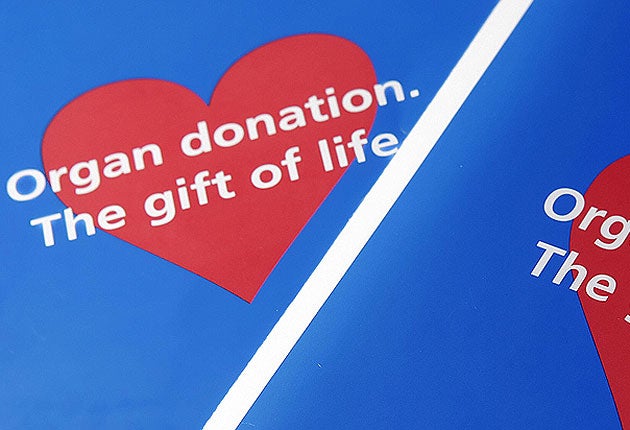Brown shelves change in organ donor law

Plans for a new opt-out system of organ donation have been shelved after experts advising the Government cast doubt on whether it would work.
Gordon Brown said he was willing to try out the recommendations of the Organ Donation Taskforce, which call for improvements to be made without a change in the law.
But the Prime Minister added that the issue might have to be "revisited" later if organ donor targets are not met.
An opt out or presumed consent system would make people automatic donors, giving doctors the right to remove their organs after death unless they make their objections clear in advance.
A "soft" version of the scheme, favoured by the British Medical Association, gives families the final say on whether a loved one's organs can be taken.
Both Mr Brown his chief medical adviser Sir Liam Donaldson are in favour of presumed consent, believing it would help reduce the chronic shortage of transplant organs and save lives.
An estimated 8,000 people in the UK need an organ transplant but only 3,000 operations are carried out each year. Every year 1,000 people die waiting for a transplant.
Currently there are almost 16 million people on the organ donor register.
However in the second of two reports, the Taskforce concluded that an opt out system was unlikely to help.
A chief worry was that such a scheme might undermine public trust in the NHS and actually reduce organ donation rates.
There were fears that it could promote myths such as the belief that care for a person close to death might be compromised by the pressing need for transplant organs.
The complexity and cost of a presumed consent system were other factors not in its favour.
Evidence from other countries suggested that opt out systems made little difference to organ donation rates, said the experts.
Speaking at a press briefing in London, Taskforce member Paul Murphy, an intensive care doctor in Leeds, said: "Our recommendation is that a system of opt out should not be introduced in the UK.
"It has the potential to undermine the concept of donations as a gift to erode trust in NHS healthcare professionals and the Government, and negatively impact on organ donation numbers."
Working groups set up by the taskforce interviewed a wide range of doctors, patients, lawyers, religious leaders and politicians.
The experts also reviewed written evidence from around the world.
They pointed out that although there often appeared to be an association between presumed consent and higher donation rates, evidence of a causal link was lacking.
Spain and Sweden both had opt out systems. But while Spain had the world's highest organ donation rate - three times that of the UK - Sweden had the lowest.
The report was welcomed by the Patients Association, but the British Medical Association said it was "disappointed".
After the report's publication, Health Secretary Alan Johnson announced the launch of a £4.5 million campaign aimed at recruiting nearly half the population to the organ donor register.
It was hoped that 20 million more people would be voluntary organ donors by 2010 and 25 million by 2013.
Speaking at 10 Downing Street today, Mr Brown said: "The proposal is that we double the number of volunteers to 50%. If we can't get there quickly, then we will return to the proposal I have put forward, which is a presumed consent system."
Moving to an opt out system would mean making an amendment to the 2004 Human Tissue Act.
The Taskforce called for more co-ordinators to support grieving families, a major publicity campaign, and an increase in the number of people ready to retrieve organs from donors.
One change now being implemented is for NHS Trusts to appoint organ donation "champions" to discuss organ donation with families.
A UK-wide network of dedicated organ retrieval teams is also being set up across the UK, and 63 new donor transplant co-ordinators will be recruited by March 2009.
Joyce Robins, co-director of Patient Concern, said it was offensive to talk about "donation" and "presumed consent" in the same breath.
"A donation is something willingly gifted," she said. "Presumed consent means requisition. The state cannot be allowed to treat our bodies like old cars that can be raided for spare parts."
But the BMA's Head of Science and Ethics, Dr Vivienne Nathanson, said: "We are obviously disappointed by this decision. The BMA firmly believes that presumed consent, combined with improvements to the transplantation infrastructure, is the way forward.
"We are, however, pleased to see that this option has not been completely dismissed."
Liberal Democrat health spokesman Norman Lamb said: "It is disappointing that today's report seeks to block the introduction of presumed consent, which evidence shows could help save the lives of many people currently languishing on the waiting lists."
Pauline Weaver, from the Donor Family Network, said presumed consent would remove the "element of gift" from the relationship between donors and transplant patients.
"Some recipients do feel guilty that someone has died for them," she said.
Subscribe to Independent Premium to bookmark this article
Want to bookmark your favourite articles and stories to read or reference later? Start your Independent Premium subscription today.

Join our commenting forum
Join thought-provoking conversations, follow other Independent readers and see their replies